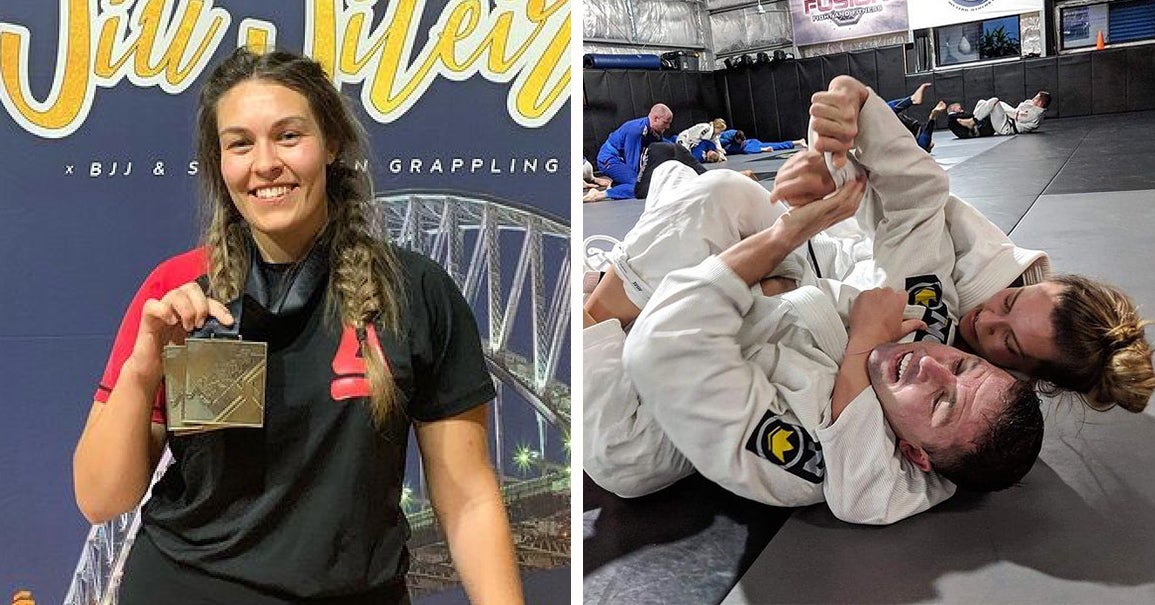
[ad_1]
View this photo on Instagram
BRAZILIAN JIU JITSU (BJJ) IS said to be for everyone — and it is. But, at the same time, your experience in it will be coloured by who you are. For me, being one of the few women who train at my BJJ gym is a powerful, liberating experience — but it’s also incredibly hard.
When I started training in 2017, and again when I started at a new gym late last year, my gender felt like a stark difference to everyone on the mat. Like many other women, I already had an approach to fit into existing dynamics and hierarchies: Try to blend in as much as possible. The first phase included observing and learning, both on the mat and the different social dynamics taking place. The second phase was about integrating into this new community and the third was about building a positive reputation in the gym.
BJJ and MMA gyms are typically ultra-masculine spaces. I mean, people come here to wrestle and throw punches at each other — which are activities that, generally speaking, appeal more to men.
In jiu jitsu, we wear coloured belts that indicate our years of experience and technical skill. While there is a culture of respect for all on the mats, having a higher belt does tend to garner a higher degree of respect and more authority to speak on and teach different aspects of the game, lending to a formal, structural hierarchy.
View this photo on Instagram
BEYOND THE MORE OBVIOUS BELT LEVELS, your competence does impact your sense of place within the community. BJJ is a sport that is notoriously hard on your ego, so getting crushed day after day often deters many participants, both women and men. And while the sport claims to be “for the little guy”, whereby smaller practitioners can theoretically out-manoeuvre bigger opponents and win using technique, physical strength does play a role in competency — especially if both practitioners have been training for a similar amount of time.
So, what does that mean for women? While we tend to be outnumbered on the mats, some of our unique traits and gendered socialisation do offer us some advantages in BJJ. Better attention to detail is a strength when learning techniques and, since many of us have slighter builds than many of our training partners, not being able to rely on physical strength means that there is more incentive to learn techniques correctly from the get go — not just muscle through tight spots.
In my personal experience, as someone that is 170cm tall and currently weighs 85kg, my body is a strength. Mass moves mass, and so my ability to use my body weight against opponents serves me well — both when I’m training with men and women. I believe that this physical reality has had more of an impact on my progress — and frankly, longevity — in the sport than my gender. It is, however, almost impossible to detangle all of these factors.
In a way, I’ve experienced a certain psychological advantages in being a bigger woman in this sport: I tend to win against men who are smaller than me, as well as men who are my size — but I can feel there’s more social, and in turn, psychological pressure on my male training partners to win when sparring with me because of our gender differences. Socially speaking, men can lose face in this situation, whereas there is nothing for me to lose, only to gain. And I’d be lying if I said it doesn’t make me feel good to beat a guy.
View this photo on Instagram
WHILE THIS MAY NOT BE TRUE FOR EVERYONE, what it has made me see is that my gender offers me certain advantages over male practitioners, whether perceived or otherwise. Whether these advantages may or may not compensate for other disadvantages in the gym is a different question.
I do find it difficult to beat men who are larger than me — unless there is a huge skill deficit where I am significantly more technical than they are. It’s a biological reality that we all have to face when fighting bigger opponents — which is why there are different weight categories in competitions, all the way from local comps right up to the UFC.
Where I believe men have it easier in this sport is when it comes to social dynamics. The social benefits of BJJ, which include making friends, feeling a sense of belonging to a community and having an activity you love that helps define you is what keeps you coming back for more. But as a woman in a male-dominated sport, socially I often feel like I’m on the outside looking in.
View this photo on Instagram
GENDER NORMS AND DYNAMICS CONTRIBUTE to a sense of belonging to a gym, which can colour experiences that many women have in jiu jitsu and broader combat sports. When it comes to adapting to the communication norms at the gym, I’ve found myself to be a lot quieter than when I’m in other social environments. Perhaps this is a result of trying to fit into the masculine space. Here, they rely less on verbal communication than women do. Or, perhaps I am less outgoing because I don’t want to seem to welcome unwanted attention.
Coming into a male-dominated space, even a positive one such as a Brazilian Jiu Jitsu gym, can be a loaded experience for women. While we want to challenge ourselves, learn how to protect ourselves and thrive in sports, there’s always the consideration that male-dominated environments aren’t safe for us. With more prominent women in the sport, like Claudia do Val coming forward with sexual assault claims against her former instructor, and Gabi Gracia dealing with gender-based bullying, we are periodically reminded of our vulnerability in these spaces. For some women, the risk is just too great, so they either never start or give up the sport completely,
For those of us that do remain, we are sometimes confronted with small, seemingly harmless instances of sexism. Personally, I’ve had training partners comment on my looks and had concepts I’m already proficient at mansplained to me by someone of a lower rank. Experiences like constantly being the last one to find a training partner — or having training partners turn me down, presumably because I’m a woman — weigh on me over time. It’s often the build up of these little things that makes me question whether or not I want to continue.
View this photo on Instagram
THE SOCIAL AND BEHAVIOURAL NORMS THAT colour the particular culture of BJJ have their origins in a time where women did not participate, so it’s not surprising that there are ongoing teething issues when it comes to making the environment more appealing for women. Many behaviours that compromise the experience women have are often not necessarily ‘bad’ or ill-intentioned. They’re just taken-for-granted male social norms that don’t serve women — or worse, hinder our experience entirely.
Thanks to social media, I often see groups of guys training together out of hours, or going to the pub together after class — activities that I rarely get invited to participate in. I often tell myself that it’s my fault for not trying harder to make friends in the gym or actively asking to be included, which is probably true. But it’s also hard to get access into the “inner circle” without having someone on the inside inviting you in. In situations like this, male training partners stepping up and including us in group activities inside and outside the gym makes a world of difference.
By no means does this account for the majority of my own experience in the sport — and in fact, BJJ has helped improve my relationship with men and masculinity — but it is a shadow that occasionally appears to remind me that while I do belong, sometimes I feel like I’m on the fringes.
View this photo on Instagram
SOMETHING THAT HELPS ME REMEMBER that I’m not alone and do belong is participating in women-only initiatives. In 2019, I attended a women’s only BJJ camp run by Australian Girls In Gi. This four day overnight camp — which had attendees in their teen years and aged 50+ — saw white belts roll with female black belts; women who weighed 40kg roll with women who weigh upwards of 90kgs; women wearing sports hijabs roll with women wearing bike shorts and sports bras.
Even though I had been training for two years prior to attending the camp, I’d realised I’d never seen so many female practitioners in the one space. I’d never rolled with so many different women at one time and gotten immediate bodily feedback about how the strategy I employ with one woman may or may not translate into rolling with someone with a different body type. We also had the opportunity to discuss the unique challenges we have as women in a safe space, where it was reassuring to hear other women sharing similar plights to mine.
This experience gave a new meaning to the idea that jiu jitsu is for everyone, and made me feel like yes, I do have a place in this sport as a woman — which renewed my own commitment and dedication to ongoing practice.
View this photo on Instagram
THE THEME OF INTERNATIONAL WOMEN’S DAY this year is “Choose to Challenge.” For me, I am interpreting that as both challenging enduring gender norms within BJJ, as well as my perception of my own limitations within this sport. While it is up to all of us to bring about change, we as women need to first give ourselves permission to want it, and then find the courage to go after it.
For me, Choose to Challenge means to challenge the limitations I place on myself in jiu jitsu and beyond; to preserve even when I feel tired or overwhelmed. To challenge myself to be curious about topics, experiences and practices I’ve not considered before — whether these are masculine or feminine. I believe that over time, with more representation, this sport will attract more women to it, and I want to be a part of that change.
To women who don’t think of themselves as strong, who have never considered themselves sporty, who are scared to walk into a class full of men — I urge you to do it anyway. Jiu Jitsu will challenge you to grow physically, mentally and emotionally and you’ll feel damn proud of yourself in the process.
Remember, change is a verb, and it’s up to all of us to put in the work.
[ad_2]
Source link





